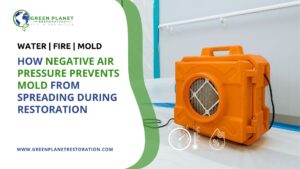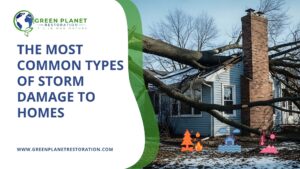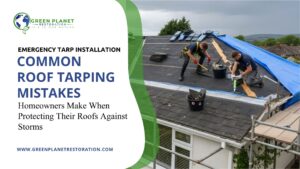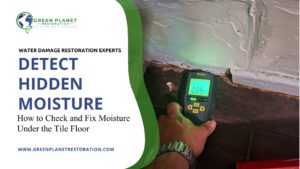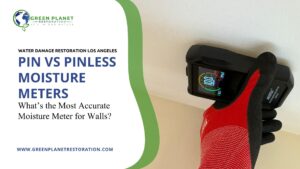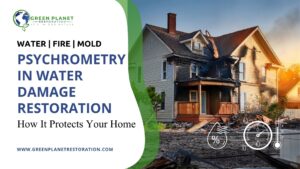Facing a water-damaged basement or a smoke-filled home after a fire incident? You must have smelled that dangerous air coming from there as well. That air is filled with fine particles, mold spores, soot, and chemical residues that float and spread with the airflow. Without HEPA Vacuuming, you may not be able to completely remove these harmful particles from your indoor environment.
For damage restoration contractors in Seattle WA, understanding the difference between HEPA air scrubbers and regular air scrubbers is important to improve job quality, safety, and trust. And if you don’t use the right air scrubber to clean up that smoke and soot, they stay in your client’s home or your team’s lungs.
What is an Air Scrubber?
An air scrubber is a mobile filtration unit. It pulls contaminated air in, runs it through filters, and pushes cleaner air back out. They are often used during mold remediation, fire damage cleanup, or large-scale demolition, where airborne particles are a major problem. The main difference lies in how effectively each scrubber removes harmful particles from the air.
What Makes a Scrubber “Regular”?
Regular air scrubbers use basic filtration, typically a pre-filter for large particles and sometimes a carbon filter for smoke odor. These units can handle dust, sawdust, and some light VOCs. But they are not built to trap microscopic particles.
Regular scrubbers can be used for tasks like sanding drywall or cleaning up harmless construction waste. These air scrubbers cannot handle airborne contaminants such as mold, smoke, bacteria, and tiny particles.
What Makes HEPA Air Scrubber Different?
HEPA stands for High-Efficiency Particulate Air. These air scrubbers are designed to capture at least 99.97% of airborne particles down to 0.3 microns. When you work in a high-risk area, such as crawl space cleanup, where moisture, mold, and indoor air quality are major issues, this level of filtration is very important. HEPA Air Scrubbers filter:
- Mold spores
- Fine soot and ash
- Pet dander
- Bacteria
- Some models can even trap certain viruses.
Why Is HEPA Vacuuming Required for Mold Removal and Restoration in Seattle?
Imagine doing mold restoration in Seattle, in a tight crawl space in Wallingford, or a wet basement in Capitol Hill. And the moment you start the cleanup work, thousands of mold spores are stirred up, and now they are floating through the air. Using a regular air scrubber, you might catch some of the larger dust. But what about mold spores? They are too small. They will move into other rooms and stay suspended in the air. They might even enter into HVAC systems.
Now, take the same scenario but with a HEPA Vacuuming running at the back. That same air, full of spores and invisible risks, gets pulled into a sealed system and filtered down to 0.3 microns. The HEPA air scrubber traps almost all of it, keeping the air cleaner and safer.
A true HEPA air scrubber typically uses a three-stage filtration system:
Stage 1: Pre-filter catches dust and larger particles.
Stage 2: Activated carbon filter absorbs odors, smoke, and gases.
Stage 3: The HEPA filter traps microscopic particles that pass through everything else.
HEPA vs Regular Air Scrubbers
| Feature | Regular Air Scrubber | HEPA Air Scrubber |
| Particle size filtered | ~10 microns and up | 0.3 microns and smaller |
| Mold spore removal | Minimal | 99.97% effective |
| Smoke & soot removal | Partially effective | Highly effective |
| Odor control | Light with a basic carbon filter | Strong with carbon + HEPA |
| Filter system | 1–2 stage | 3-stage (Pre, Carbon, HEPA) |
| Compliance for mold/fire jobs | Often not acceptable | Meets industry standards for remediation |
| Common uses | Construction dust, debris | Mold, fire, sewage, and post-flood cleanup |
| Cost of filters | Low upfront, may clog quickly | Higher, but longer lifespan and better results |
Did sewage or floodwater soak into your drywall? Learn Why You Must Replace Sewage-Damaged Drywall And How to Do It
Why It Matters for Seattle Contractors
Most mold removal standards, especially those that are based on IICRC guidelines, call for HEPA filtration on containment jobs. Insurance adjusters also ask if HEPA filtration was used, and indoor air quality tests may be required after certain types of work.
Using regular scrubbers in those situations can create problems. You might pass visual inspection but fail post-cleaning clearance testing. That will cost a lot to fix up again, especially if people are already living in the house.
Closing Remarks
Regular air scrubbers can remove the basics, but not microscopic threats. Damage restoration contractors in Seattle, WA, use HEPA air scrubbers to protect workers, satisfy clients, and meet industry standards. At Green Planet Restoration, we work with Seattle’s top contractors to support high-quality cleaning and restoration. Our HEPA Vacuuming team handles projects throughout Washington. We assist you with the right tools and trained technicians for handling mold removal after fire damage.
Contact Green Planet Restoration immediately to learn more about our HEPA-grade services and equipment. We provide air quality support for mold, smoke, fire, and water damage restoration.
______________________
Related Articles
Complete Guide to Crawl Space Maintenance and Cleanup
24 Hour Plumbing Emergency Guide
How LGR Dehumidifiers Prevent Secondary Damage
How Moisture Meters Prevent Mold Growth
Leaking Ice Makers: Why They Happen and How to Prevent Them
How To Handle Flood Damage in Southern California
Should I File an Insurance Claim for Water Damage?




